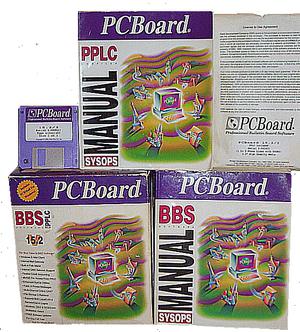
A bulletin board system (BBS), also called a computer bulletin board service (CBBS), is a computer server running software that allows users to connect to the system using a terminal program. Once logged in, the user can perform functions such as uploading and downloading software and data, reading news and bulletins, and exchanging messages with other users through public message boards and sometimes via direct chatting. In the early 1980s, message networks such as FidoNet were developed to provide services such as NetMail, which is similar to internet-based email.
FidoNet is a worldwide computer network that is used for communication between bulletin board systems (BBSes). It uses a store-and-forward system to exchange private (email) and public (forum) messages between the BBSes in the network, as well as other files and protocols in some cases.
UUCP is an acronym of Unix-to-Unix Copy. The term generally refers to a suite of computer programs and protocols allowing remote execution of commands and transfer of files, email and netnews between computers.

Apple Mail is an email client included by Apple Inc. with its operating systems macOS, iOS, iPadOS and watchOS. Apple Mail grew out of NeXTMail, which was originally developed by NeXT as part of its NeXTSTEP operating system, after Apple's acquisition of NeXT in 1997.

Pegasus Mail is a proprietary email client developed by David Harris. It was originally released in 1990 for internal and external mail on NetWare networks with MS-DOS and later Apple Macintosh clients. It was subsequently ported to Microsoft Windows, which is now the only platform actively supported. Previously freeware, Pegasus Mail is now donationware.
Synchronet is a multiplatform BBS software package, with current ports for Microsoft Windows, Linux, and BSD variants. Past versions also ran on MS-DOS and OS/2, but support for those platforms were dropped in version 3.0.
WWIV was a popular brand of bulletin board system software from the late 1980s through the mid-1990s. The modifiable source code allowed a sysop to customize the main BBS program for their particular needs and aesthetics. WWIV also allowed tens of thousands of BBSes to link together, forming a worldwide proprietary computer network, the WWIVnet, similar to FidoNet.

PCBoard (PCB) was a bulletin board system (BBS) application first introduced for DOS in 1983 by Clark Development Company. Clark Development was founded by Fred Clark. PCBoard was one of the first commercial BBS packages for DOS systems, and was considered one of the "high end" packages during the rapid expansion of BBS systems in the early 1990s. Like many BBS companies, the rise of the Internet starting around 1994 led to serious downturns in fortunes, and Clark Development went bankrupt in 1997. Most PCB sales were of two-line licenses; additional line licenses were also available.
A DOS extender is a computer software program running under DOS that enables software to run in a protected mode environment even though the host operating system is only capable of operating in real mode.
Mystic BBS is a bulletin board system software program that began in 1995 and was first released to the public in December 1997 for MS-DOS. It has been ported to Microsoft Windows, OS/2, OS X, and Linux. Mystic was designed to be a spiritual successor to the Renegade (BBS) and Telegard bulletin board systems.

The Rainbow 100 is a microcomputer introduced by Digital Equipment Corporation (DEC) in 1982. This desktop unit had a monitor similar to the VT220 and a dual-CPU box with both 4 MHz Zilog Z80 and 4.81 MHz Intel 8088 CPUs. The Rainbow 100 was a triple-use machine: VT100 mode, 8-bit CP/M mode, and CP/M-86 or MS-DOS mode using the 8088. It ultimately failed to in the marketplace which became dominated by the simpler IBM PC and its clones which established the industry standard as compatibility with CP/M became less important than IBM PC compatibility. Writer David Ahl called it a disastrous foray into the personal computer market. The Rainbow was launched along with the similarly packaged DEC Professional and DECmate II which were also not successful. The failure of DEC to gain a significant foothold in the high-volume PC market would be the beginning of the end of the computer hardware industry in New England, as nearly all computer companies located there were focused on minicomputers for large organizations, from DEC to Data General, Wang, Prime, Computervision, Honeywell, and Symbolics Inc.

Blue Wave is a file-based offline mail reader that was popular among bulletin board system users, especially users of FidoNet and other networks that generated large volumes of mail. It allowed users to download all of their mail and messages, read and edit them offline, and then upload any replies. This reduced the amount of time they spent on line. The name "Blue Wave" originally referred to the client software, but as new clients were written that supported the same file format, the name came to refer primarily to the format itself.
QWK is a file-based offline mail reader format that was popular among bulletin board system (BBS) users, especially users of FidoNet and other networks that generated large volumes of mail. QWK was originally developed by Mark "Sparky" Herring in 1987 for systems running the popular PCBoard bulletin board system, but it was later adapted for other platforms. Herring died of a heart attack in 2020 after being swatted. During the height of bulletin board system popularity, several dozen offline mail readers supported the QWK format.
CrossDOS is a file system handler for accessing FAT formatted media on Amiga computers. It was bundled with AmigaOS 2.1 and later. Its function was to allow working with disks formatted for PCs and Atari STs. In the 1990s it became a commonly used method of file exchange between Amiga systems and other platforms.
An offline reader is computer software that downloads e-mail, newsgroup posts or web pages, making them available when the computer is offline: not connected to a server. Offline readers are useful for portable computers and dial-up access.
The JAM Message Base Format was one of the most popular file formats of message bases on DOS-based BBSes in the 1990s. JAM stands for "Joaquim-Andrew-Mats" after the original authors of the API, Joaquim Homrighausen, Andrew Milner, Mats Birch, and Mats Wallin. Joaquim was the author of FrontDoor, a DOS-based FidoNet-compatible mailer. Andrew was the author of RemoteAccess, a popular DOS-based Bulletin Board System. JAM was originally released in 1993 in C, however the most popular implementation was Mark May's "MK Source for Msg Access" written in Pascal which also saw its initial release in 1993.

RemoteAccess is a DOS Bulletin Board System (BBS) software package written by Andrew Milner and published by his company Wantree Development in Australia. RemoteAccess was written in Turbo Pascal with some Assembly Language routines. RemoteAccess began in 1989 as a clone of QuickBBS by Adam Hudson. It was released under the shareware concept in 1990 and became popular in North America, Europe, UK, South Africa, and the South Pacific. Initially the main advantage over QuickBBS was its ability to run multiple nodes under Microsoft Windows, Quarterdeck's DESQview and OS/2. RA could also operate over a network or even a combination of network and multitasking operating systems to provide multiple "nodes per station" capabilities.
GT Power is a bulletin board system (BBS) and dial-up telecommunications/terminal application for MS-DOS. It was first introduced in the 1980s by P & M Software, founded by Paul Meiners. GT Power can be used both to host a BBS as well as to connect to other BBS systems via its full-featured dial-up "terminal mode". GT Power was a shareware package that required a registration fee in order to access its proprietary network mail transport/handling software and, by default, the GT Power Network. The software is distributed in two "flavors": a terminal-only version, nicknamed GTO, and the full-featured host and terminal version.
StarDoc 134 is a Dos/Linux hybrid BBS running EleBBS maintained by Andrew Baker aka "RamMan, Dotel and Dotelpenguin".
FrontDoor was one of the most popular mailers in the FidoNet-compatible networks in the 1990s, acting as the physical representation of the written network node connection and mail handling standards. It was an MS-DOS-based product written by Joaquim Homrighausen. The FrontDoor system contained a Mailer, an Editor, a Terminal, a serial port device driver and configuration utilities. FrontDoor was first released in 1986.